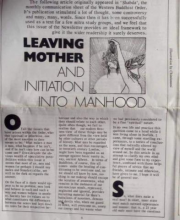Abuse & Trauma
Can adults be victims of religious organisations?
Buddhist teachings specifically forbid sexual misconduct. In Triratna, Lingwood did not deny that he was having sexual relations with young men, but he also justified what he was doing by saying that it was a temporary “experimentation” with different forms of communication. However, the abuse went on for many years and during this time, Lingwood would wear the traditional orange robes of a celibate monk.
Inside Out East BBC programme about Triratna
Jo Taylor examines whether Triratna's mistakes from the past have been addressed properly, interviewing former members of the FWBO/Triratna
Silencing and Oblivion of Psychological Trauma, Its Unconscious Aspects, and Their Impact on the Inflation of Vajrayāna
The commercialization of Buddhist philosophy has led to decontextualization and indoctrinating issues across groups, as well as abuse and trauma in that context. Methodologically, from an interdisciplinary approach, based on the current situation in international Buddhist groups and citations of victims from the ongoing research, the psychological mechanisms of rationalizing and silencing trauma were analyzed. The results show how supposedly Buddhist terminology and concepts are used to rationalize and justify economic, psychological and physical abuse.
Mark Dunlop's account
Mark Dunlop's involvement with the FWBO
Prasannasiddhi's letter
Dear Dhammarati and Order Members,...
Text of 1997 Guardian article highlighting abuse issues in the FWBO
As with many new religious movements, their enthusiasm and unconventional convictions have the potential to lead to problems associated with 'cults'.

